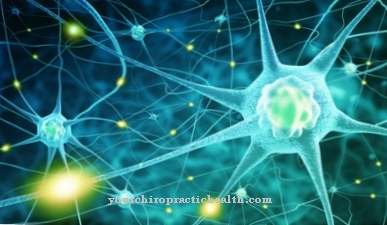The human bladder holds around 300-450ml urine, which takes around 4-7 hours. As a result, we feel an urge to urinate and go to the toilet to relieve ourselves, but this does not work for everyone. Something that those affected do not even talk about in many cases are so-called Micturition disorders.
What is urination disorder?

The term micturition disorder summarizes the difficult or incomplete emptying of the bladder, the infrequent delivery of urine and the involuntary loss of urine (incontinence). Women are affected more often with 14.7 percent than men with only around nine percent, as the female sphincter muscle is more vulnerable and the muscles of the pelvic floor are more often weakened.
If no urine or less than 100 milliliters are excreted over a period of 24 hours, doctors speak of a so-called anuria. However, if the daily amount of urine is more than three liters per day, one speaks of a polyuria. A daily urine output of less than 500 milliliters is called oliguria. The interaction of various causes is responsible for the dysfunction of the bladder. The micturition disorder is therefore not a uniform clinical picture.
causes
There is a wide range of possible causes for micturition disorder. The mechanical causes include, for example, when the urethra or the urinary bladder is damaged, changed or inflamed. Tumors of the urethra or urinary bladder, foreign bodies that cause obstruction of the urethra or foreign bodies in the urinary bladder are also included.
Urethral valves (spread out, sail-like membranes that appear in boys as young children and are responsible for irreversible damage), urinary tract infections (urethritis) or narrowing of the urethra (urethral stricture) can also be the cause of impaired emptying of the bladder. Enlargement of the prostate (prostatic hyperplasia), bladder infections (cystitis), protrusions of the urinary wall (urinary bladder diverticula), in the vaginal and bladder area as well as intestinal and bladder fistulas, urinary bladder stones or renal insufficiency also come into consideration.
Dementia, Parkinson's disease, multiple sclerosis or a spinal abscess or other spinal cord lesions are known to be neurogenic causes. But certain drugs for drainage (diuretics) can also trigger increased urine excretion.
There are many symptoms of a micturition disorder. A feeling of incomplete emptying of the bladder (residual urine formation) and persistent dripping of urine after urination may be signs. Sometimes the start of micturition is delayed or the urine stream is interrupted, which is also known as "urinary stutter". Some people feel the urine stream weakened to the point of dripping or even an extended duration of urination.
Occasionally, however, an imperative urge to urinate can also set in: a very strong and irresistible urge that can also lead to urge incontinence and even worsen to nocturia if the urge to urinate occurs more than twice a night. A micturition disorder can also be noticeable in smaller amounts of urine with a significantly increased frequency of micturition or accompanied by difficult urination.
Pain when urinating is a clear sign, especially if only a very small amount of urine is emptied and may even be accompanied by cramps. Urinary incontinence, in which there is involuntary loss of urine, can also cause micturition disorders. A distinction is made between urge incontinence, stress incontinence, overflow incontinence, reflex incontinence and mixed incontinence.
You can find your medication here
➔ Medicines for bladder and urinary tract healthDiseases with this symptom
- Urethral cancer
- Urethritis
- dementia
- Bladder cancer
- Prostate enlargement
- Kidney weakness
- Urethral stricture
- Cystitis
- Bladder diverticulum
Diagnosis & course of disease
Every affected person needs individual care, since micturition disorders and incontinence are still a big taboo topic in our society and sick people are often plagued by great shame. Urologists usually start with the patient's medical history.
If the patient reports one or more of the typical symptoms of micturition disorder, a physical exam will be performed. Important factors, such as the physical condition, are recorded here. Obesity (overweight) is a risk factor for incontinence, but pregnancies can also be the trigger. Diabetes mellitus is also a cause of a micturition disorder, because a metabolic imbalance often leads to a pathological increase in the amount of urine.
The so-called laboratory diagnostics includes all apparatus-based examinations. Urine test strips provide information about diseases of the bladder, kidney or liver, and a microscopic examination of the midstream urine provides information about a possible urinary tract infection. In a urinary excess reaction, certain chemicals are added to the patient's urine. In this way, functional disorders and even metabolic disorders are recognized.
In order to rule out possible prostate hyperplasia, prostate cancer and benign prostate syndrome, a digital, rectal examination is necessary. Using a micturition cystourethrogram, the urinary bladder is filled with a contrast medium through a catheter through the urethra. In this way, the backflow of urine via the ureters into the renal pelvis can be detected in order to be able to determine anatomical or functional disorders of the urinary bladder emptying.
Complications
Micturition disorders have different causes with different complications. Common is some inflammation of the urethra or urinary bladder. A systemic spread of the pathogen (sepsis) can result here as a complication. Sepsis is a life-threatening condition and leads to death in over half of all cases. Urinary stones can also lead to disturbances in the flow of urine.
This leads to a build-up of urine up to the kidneys, which can become inflamed and this can also lead to sepsis. An enlarged prostate (prostatic hyperplasia) can cause urination disorders. This can also lead to urine build-up and thus inflammation of the kidney. The kidneys usually suffer permanent damage.
The enlargement of the prostate leads to a painful enlargement of the bladder due to the backlog of urine, the wall of which can consequently thicken and possibly form diverticula which can subsequently become inflamed. Another way in which the flow of urine is inhibited is a urethral valve, which can develop in boys. Here, too, there are complications similar to those of urinary retention.
Some dementias also cause urinary disorders. Complications vary depending on the type of dementia. Those affected usually change their behavior and personality, and often become more aggressive and outrageous. In addition, there is usually an exclusion from society, a social isolation, the situation is similar with Parkinson's disease.
When should you go to the doctor?
A micturition disorder should be examined by a doctor at the latest if it does not only occur as an isolated case. Occasional, uncontrolled discharge of urine or the occasional feeling of not being able to urinate properly, however, are often harmless.
A doctor should be consulted urgently if uncontrolled urine leakage occurs over a whole day, which can no longer be explained by a single cause (for example a cramp or a strong laugh). Pain when urinating is also a reason to see a doctor. It is important to clarify what the cause is. Potential urinary tract infections need to be identified and treated before they can spread. A doctor must also be consulted immediately if urination no longer works at all. Urinary retention is a medical emergency and requires immediate treatment to prevent kidney damage from blocked urine.
A visit to the urologist is essential. A urologist can better perform a detailed examination of the urinary tract and, if necessary, assistance with urination than a general practitioner. Urological practices also have the necessary equipment to be able to act quickly in the event of acute causes.
Doctors & therapists in your area
Therapy & Treatment
There are various therapeutic measures for treating a urination disorder. The exact diagnosis of the malfunction of the bladder and / or sphincter muscle is decisive here. In the case of obese patients, the first step is to lose weight; in the case of poorly controlled diabetics, an individual insulin plan is created. In this way, metabolic derailments can be prevented and thus also polyuria.
If the micturition disorder has a mechanical cause (tumors, foreign bodies, fistulas), this can be corrected surgically if necessary. It is also possible to place a small ribbon under the urethra without tension in the case of involuntary loss of urine. The medical treatment of micturition disorders has become an integral part of today's medicine and is an important part of therapy.
The following groups of phytopharmaceuticals, alpha-1-receptor blockers and 5-alpha-reductase inhibitors, which, among other things, can reduce the prostate volume, take effect here. But the easy-to-use pelvic floor training can also be used to treat possible pelvic floor weaknesses. Combination therapies are also possible.
Outlook & forecast
In the case of a micturition disorder, the pathogen usually spreads relatively quickly to other regions. For this reason, treatment by a doctor is required. If the urine builds up, it can cause kidney infection. In this case, urination is associated with severe pain. This can lead to irreversible damage to the kidney, which as a rule cannot be treated. If the urine builds up, the bladder can enlarge, which is also painful.
The patient is severely restricted in his everyday life by the urination disorder. Above all, this can have a negative effect on the practice of certain professions. Societal and social problems can also arise here. Treatment is not always successful and can result in permanent damage to the kidney.
In many cases, surgical interventions are necessary to correct the symptom and the pain associated with it. If the kidney is badly damaged and no longer functional, a kidney transplant is necessary. In many cases, diabetics can reduce their weight to counteract the urination disorder.
You can find your medication here
➔ Medicines for bladder and urinary tract healthprevention
Timely prophylactic measures are important if you want to avoid micturition disorders as much as possible. Obesity should be avoided in order to prevent stress incontinence later on. Some medications can make urination disorders easier or worse. Women should do regular pelvic floor exercises, especially after pregnancy.
A toilet or bladder training can help. A micturition log is kept in which the frequency and amount of urine excretion are recorded. Adjusted drinking quantities and set times for urine excretion are important here. This allows the bladder to get used to regular emptying.
In all preventive measures, it is important to consult a urologist so that additional problems do not arise in the first place. Constipation prophylaxis is also useful to prevent urination disorders. Because constipation leads to strong pressing and pressing - and thus possibly to an involuntary loss of urine.
You can do that yourself
In most cases, reducing weight helps with urination disorder. This reaction has to be made especially in patients with diabetes. In this case, healthy eating and exercise are suitable to counteract the urination disorder.However, there are no direct ways to help yourself with urination disorder. The disorder is usually treated with medication and cannot be controlled by home remedies.
To prevent urination disorder, people should usually go to the toilet whenever they feel the urge to do so. It is extremely unhealthy to hold a urge to urinate and not to empty your bladder. This is especially true for people who, because of their job, cannot go to the bathroom very often. Truck drivers and bus drivers in particular are affected by this problem and should always empty their bladder regularly to avoid micturition disorders.
In any case, the patient should limit their fluid intake at inconvenient times in the event of a voiding disorder. This is especially true before bed. Coffee and alcohol should be avoided. Various pelvic and bladder exercises can be performed to treat the symptom.

.jpg)

.jpg)


.jpg)






.jpg)

.jpg)
.jpg)











.jpg)